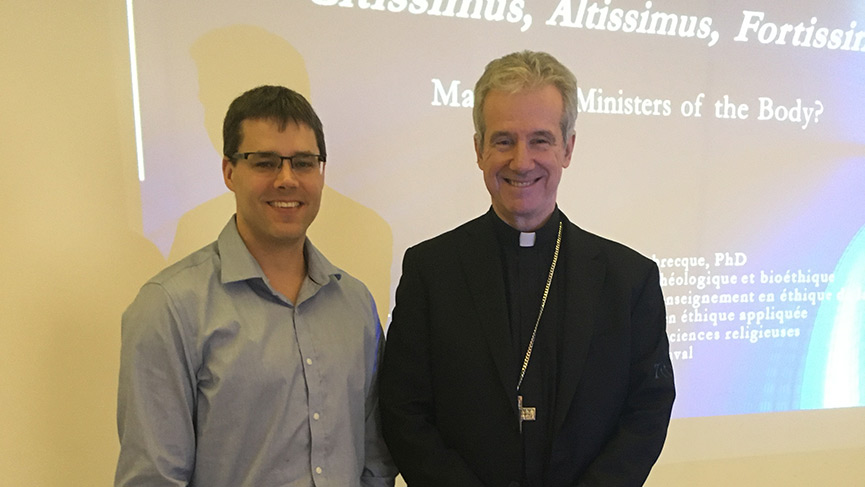Bio-enhancement and morality: Where do Christians stand?

Montreal
A symposium on ''human enhancement'' took place, Oct. 25, at the Grand Seminary of Montreal, to discuss issues related to biotechnology and their impact on our ability to understand humanity and human nature better, from a Christian perspective. Archbishop Christian Lépine was in attendance to officially welcome participants.
Co-sponsored by the Canadian Council of Churches’ Faith and Life Sciences Reference Group, in collaboration with the Canadian Centre for Ecumenism, this was the second of a two-day ecumenical symposium on Christianity and enhancement technologies. It was open to scholars, students and to those wishing to get informed and to reflect in the presence of Roman Catholic, Protestant and Orthodox representatives. Canada is leading the way when it comes to discussing moral bio-enhancement through the lens of faith, as General Secretary of the Canadian Council of Churches Peter Noteboom explained: “The world of theology is slowly awakening to the moral issues raised by new biotechnology.”
With new promising prospects on the rise to enhance human abilities and, possibly, social behaviours by tampering moods—think Ritalin here—one can start wondering about what human beings really are. What are we the stewards of when it comes to our body? Do we seek enhancements to become better or faster, to stop aging, to be morally more responsible? What is it that we really wish to improve, and in doing so, do we stop being Divine image bearers through bio-enhancements?
Those are the questions that University Laval Associate Professor of Theological Ethics and Bioethics, and Inaugural Chair of the Ethics of Life, Cory Andrew Labrecque, tried to answer. He was supported by the Faith and Life Sciences reference group panel, composed of Queen’s University Professor Tracy Trothen (United Church), University of Toronto doctoral candidate, Michael Buttrey (Anglican Church) and CCBI Executive Director, Moira McQueen (Catholic Church).
Questions were raised and topics debated, as the subject offers perspectives that greatly challenge Church-related beliefs and doctrines, and one’s ability at times to decipher the right from the wrong. Many undergraduate students were in attendance taking notes; it shows the deep interest moral bio-enhancement now generates in the world of theology.
Yet, the subject is complex and answers do not come up simply. Moral stands will need to be taken in the future on topics involving enhancement technologies related to subjects ranging from anti-aging solutions to end-of-life care. What purpose will bio-enhancement serve? Where will moral education unfold and stand on the subject? “There is a necessity to reflect on these topics,” Peter Noteboom concluded. This remains to be seen, but one can safely predict that we are at the dawn of fabulous discussions in which the human person will stand at the very centre.

Comment
0 Comment
Add new comment